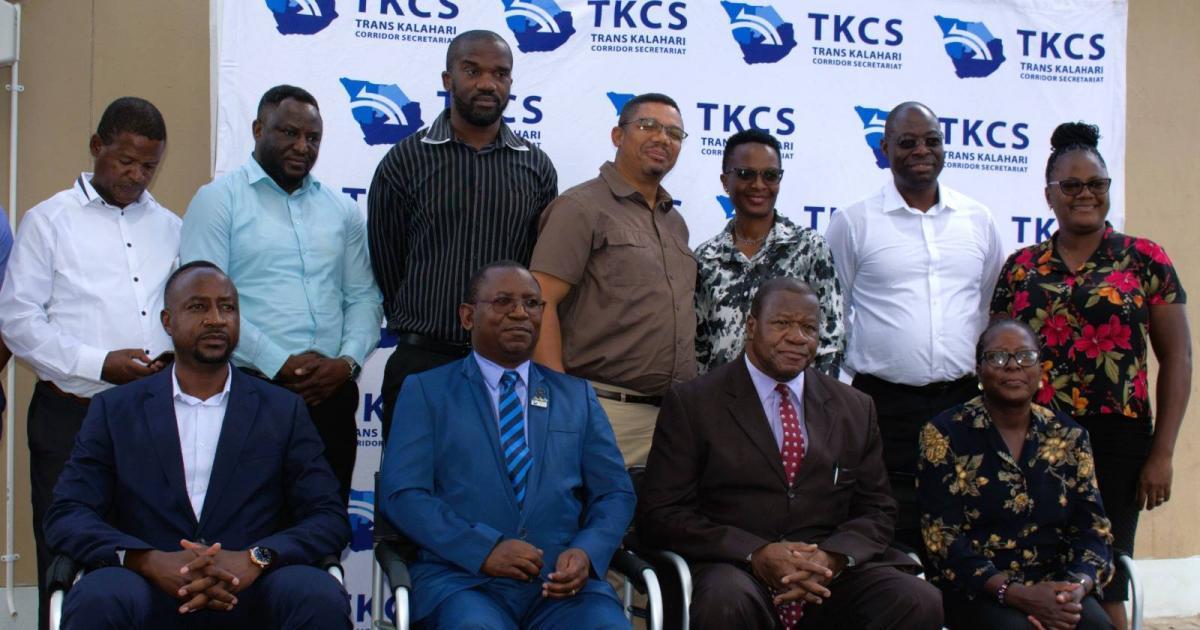Africa-Press – Botswana. November 3, 2003 officially marked the beginning of a collaborative journey by Botswana, Namibia and South Africa towards promoting deeper regional integration through proper management of the 1 900km Trans Kalahari Corridor (TKC) stretch that passes through the three member states.
Putting pen to paper on that date solidified the neighbourly relations between the trio for the smooth and safe movement of people, goods and services, even beyond the regional shores.
Spanning from Gauteng Province in South Africa, through Lobatse in Botswana until it reaches Walvis Bay in Namibia, the road offers the shortest link between the three countries, extensively linking the region to international markets.
The establishment of the Trans Kalahari Corridor Secretariat (TKCS) was intended to develop, facilitate and manage the corridor to promote trade and grow the economy while at the same time creating employment opportunities for the communities along the TKC.
“Having concluded the Memorandum of Understanding (MoU) on the Development and Management of the Trans Kalahari Corridor on the 3rd of November 2003, we the Governments of Botswana, Namibia and South Africa are committed to individually and collectively attain sustainable growth and development, implement the integrated and seamless movement of goods and persons on the Trans Kalahari
Corridor with a view to reduce transport costs and transit times and increasing competitiveness.
This charter therefore embodies our commitment to our clients in terms of service delivery and accountability,” reads the TKC Clients Service Charter.
In an endeavour to deliver on their pledges and promises, the member states adopted the multi-sectoral approach to the development and implementation of strategies geared towards creating a conducive environment for seamless movement of goods and people.
In addition to the regular individual mini operations held by each state, the partners popularised the rotational Joint Law Enforcement Operation (JLEO), which brings together various stakeholders from transport, police, immigration and revenue services, among others.
The joint operations are intended to promote compliance on the road while at the same time harmonising procedures and processes for cross border and transportation along the TKC.
For the just-ended TKC 12th JLEO, which paved the way for the 20th anniversary scheduled for Namibia in November, more than 300 law enforcement operatives descended on the mining town of Jwaneng for a week-long operation at the Sese junction, about eight kilometres south of Jwaneng.
While acknowledging that more work was needed to keep developing the TKC and ultimately driving it towards attaining smart corridor status, TKC’s executive director, Mr Leslie Mpofu, said he appreciated the strides made during the past 20 years.
In an interview, he said they had successfully harmonised some regulations and simplified cross- border procedures between the three countries.
He noted that the adoption and implementation of customs legislation such as the Single Administrative Document (SAD 500) indicated the progress they had made in the two decades.
“It is a great achievement that we have managed to reach in 20 years and we have achieved a lot in harmonising our regulations and simplifying our border procedures.
Of course we cannot say we have achieved everything, but we have managed to implement legislation such as the SAD 500, which has made it easier for the travellers,” he noted.
He further indicated that approving the use of National Identity cards for cross-border travel between Botswana and Namibia, which was first implemented at the Mamuno Border Post in February, was a progressive development towards enhancing economic and regional integration, as well as eliminating barriers to seamless movement of people, goods and services.
This historic milestone, which has since been extended to the rest of the border posts between the two countries, was further instrumental in ensuring efficiency at the Mamuno One Stop Border Post.
He said they had been advocating for the governments to simplify travel between the states, especially for regular travellers such as truck drivers.
“We have been negotiating for the longest time with member states to do something with our passports that could help our drivers who cross borders frequently yet the passports have few pages. Therefore this is a welcome development because it eliminates the challenge we have been having.”
On promoting economic activity and creating employment opportunities along the TKC, Mr Mpofu said they continued to engage potential investors about strategic commercial enterprises along the corridor.
He said three new businesses were recently established at Mamuno to exploit the economic potential associated with the high volumes of cross-border traffic.
He noted that the new developments also signified the role of the private sector in the development of the TKC and the participating countries.
In addition, he said, their mobilisation efforts would in the near future see the establishment of various business entities such as truck stops and maintenance centres at various points for the vehicles on transit.
“These are the efforts that we are coming up with to ensure that there is creation of employment along the corridor,” he said.
Going forward, the aspiration is for the TKC member states to hamornise visas issued to travellers visiting either of them.
This, he said, would promote the tourism sectors within the three countries by making it easy for tourists to use one visa.
Mr Eric Molale, Botswana’s Minister of Transport and Public Works, reiterated the importance of maintaining a safe and secure corridor, free of contraband.
He said as an international corridor, the development and mandate of the TKC resonated with the African Continental Free Trade Area aspirations, hence the need to intensify law enforcement.
He also called on mobile network providers to improve connectivity along the corridor for smooth and effective communication.
For More News And Analysis About Botswana Follow Africa-Press






